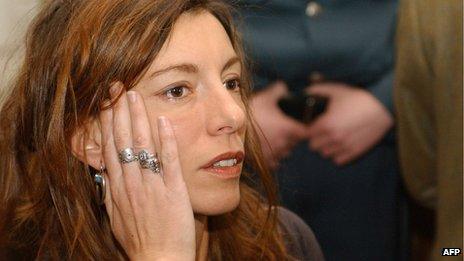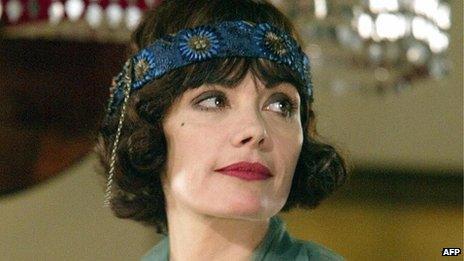French killer Bertrand Cantat's controversial comeback
- Published

Despite his conviction for murder, and dark questions about his role in his wife's suicide, Bertrand Cantat insists he has been misunderstood
The man hailed as the Jim Morrison of French rock returns to the music scene this week with his first record release since murdering his girlfriend in 2003.
But the long-awaited comeback of Noir Desir frontman Bertrand Cantat, 49, has been overshadowed by fresh allegations over the suicide of another woman in his life.
Kristina Rady, a respected Hungarian arts director and Cantat's wife, hanged herself in 2010 - two-and-a-half years after the singer's release from jail for killing the actress Marie Trintignant in Lithuania.
In a telephone message to her parents left six months earlier, Rady spoke of the psychological and physical violence to which she said Cantat was subjecting her.
She said that "a series of events worse than those of 2003" was taking place; that on several occasions she had narrowly "escaped the very worst"; and that "if anything happened... there would be witnesses to testify".
The couple married in 1997 and had two children. But they separated in 2002 after Cantat started his affair with Marie Trintignant.
'Terrible things'
After Cantat beat the actress to death in a Vilnius hotel room, Rady stuck by him and gave evidence in court on his behalf. When he was granted conditional release in 2007, they tried to resume their relationship.
But in January 2010, Rady told her parents that she was suffering mental and physical abuse, and feared for her life.
"Everyone thinks he's an icon, and everyone wants the best for him, but then he comes home and does these terrible things to me in front of the family," she said.
Revelations about the telephone recording have led magistrates in Bordeaux to re-open the investigation into Rady's suicide.
Campaigners on behalf of victims of marital violence say there is a clear legal case to answer, and that a prosecution could be brought against Cantat for indirectly causing Rady's suicide.

Kristina Rady stood by her husband during his trial for murder
Further questions over Cantat's return to the spotlight have been raised as a result of a sympathetic interview in Les Inrockuptibles magazine - the first time the singer has spoken in public since the murder.
In the interview Cantat complains of how the "media circus" twisted the events of Vilnius; how "my own story was stolen from me"; and how "my view of events, my testimony was given no space".
"My remorse, my suffering, my sensitivity - it didn't count for anything in the story. I became a caricature. The fact that I love Marie so much - it was wiped. All they wanted was what was sordid. What was beautiful was hidden," he said.
Asked about the Rady suicide, he said: "My God, it's the same soap opera... the assumptions and the delusional accusations concerning me are unacceptable. It's appalling, disgraceful to have become the symbol of violence against women."
He said he was in touch with Rady's parents, who "recently spent a week with us. It was very warm... People tried to tell them I was a murderer, but they came to see they'd been manipulated."
Yael Mellul, a feminist lawyer who is pushing to have Cantat questioned about Rady's death, said the interview was "unspeakably indecent".
"This is a man who beat a women to death with his bare hands. But in the interview he dares to talk of his love for Marie. He says it's terrible to have been turned into the symbol of violence against women.
"He positions himself as the victim - so it's our fault that his life is so painful. It's a moral inversion that is classic for this kind of perverted personality," she said.
Left's 'indulgence'
In Le Point news magazine, editor-in-chief Franz-Olivier Giesbert was equally scathing.
"This is not a tale of forgiveness and redemption. It's the story of a narcissistic killer, a master of self-pity.
"Most murderers, after they're released, just want to be forgotten. Not Bertrand Cantat. He needs to show his wounds to the people. He's made a career of it," he wrote.

Marie Trintignant starred in more than 30 films
And Giesbert went further - accusing the "alternative left" establishment of being "incredibly indulgent" towards the singer.
"It's normal. He's a card-carrying member of the politically correct," he said.
Noir Desir was the most influential French band of the late 1980s and 1990s, combining high-pace rock with a strong anti-capitalist message.
"The 1992 album Tostaky was a landmark album in French music. They were the only French group remotely able to capture the energy of bands like Nirvana," said Olivier Nuc, music critic of Le Figaro.
"Cantat was incredibly good-looking. Every girl at university was in love with him. And now he has this terrible image with women. It's the opposite of what he represented before.
"But you can see from the interview that in some ways he still does not understand why people are offended by what he did. Clearly his is a highly narcissistic personality."
The new album - called Horizons - is, according to Nuc, a difficult and painful listen.
"Personally I have no problem with his making music. That's his job. The problem is all the promotion that goes with it. He should have released the record and shut up.
"But on its own terms the record is a success. It's dark, harrowing and depressing. Quite clearly it is translating his feelings into music - which after all is the job of art."
- Published7 April 2011